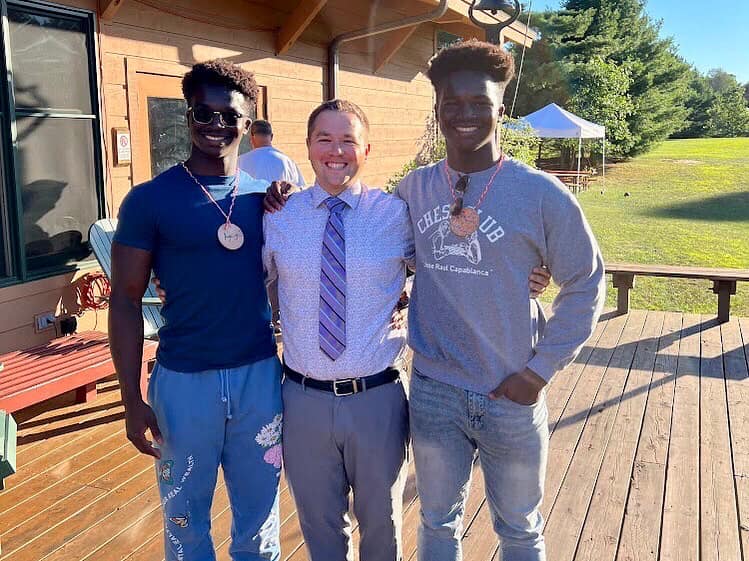The Power of Forgiveness
by Bishop Chris Giesler
Sermon Texts:
Genesis 18:21-35
Matthew 18:21-35
So, what is your definition of infinity? I often think of the limitless end of our universe. It is something we simply cannot imagine – it just keeps going. Our Gospel lesson for this week begins like this: “Then Peter came to Jesus and asked, ‘Lord, how many times shall I forgive my brother or sister who sins against me? Up to seven times?’” Jesus answered, “I tell you, not seven times, but seventy times seven, or 77 times.” This, you see, is the Biblical definition of infinity!
Peter thinks he has it right, not just three, but double that and add one for good measure. Seven is the perfect Biblical number, after all. But Jesus says, you’ve only just begun – extend the perfect number of 7 beyond your wildest imagination.
Our text from Genesis gives us a profound story of the power of forgiveness. Joseph, the youngest of Jacob’s 12 sons, appeared to be his father’s favorite, and he bragged about it often. He would tell his brothers about dreams that he had. Dreams where he was the king and all of his brothers were serving him. His dad once gave him a fancy new coat with many colors, something his brothers had not gotten. Joseph told them that he thought he looked pretty good in it. His brothers were furious. So angry they plotted to kill him but could not bring themselves to do it. Instead, they sold him into slavery to a caravan traveling to Egypt. The brothers then returned to Jacob and told him that a wild animal had killed him. It’s not exactly the model of brotherly love. Most of us would have carried a grudge for the rest of our lives. But rather than allowing this profound betrayal and ensuing disappointment to rule his life, Joseph focused on the present, making the most of each opportunity. As time went on, Joseph so impressed everyone in Egypt with his intelligence that he eventually was named the Prime Minister of Egypt by the Pharaoh. So skilled was he as an administrator that in seeing that a famine was coming upon that region of the world, he wisely built storage facilities to stockpile food supplies to last through the famine. So, when people from Israel came searching for food, who do you suppose came before Joseph to request provisions? His brothers. And in one of the most moving passages of scripture, Joseph says to them: “Do not be afraid! Am I in the place of God? Even though you intended to do harm to me, God intended it for good in order to preserve a numerous people, as he is doing today. So have no fear; I myself will provide for you and your little ones.” In this way, he reassured them, speaking kindly to them (Genesis 50:20-21). An amazing story of forgiveness.
I live in Pennsylvania, and I frequently have the opportunity to visit some of our Moravian Congregations located in Amish Country. Seeing these folks riding in their buggies pulled by a horse or out tending their farms is always a pleasure. But whenever I see them, the word forgiveness comes to mind. We learned a lot about forgiveness from the Amish in October of 2006 when a gunman entered an Amish schoolhouse and took hostages. He eventually shot 10 of the girls, ages 6 to 13; five died, and five survived. The gunman then took his only life in the schoolhouse.
While most of us would have lashed out in anger at this man’s family, we soon saw that within hours of the shooting, the family received a visit from an Amish neighbor offering comfort and speaking words of forgiveness. One article mentioned that another Amish man held the gunman’s father in his arms for an hour. The Amish set up a charitable fund for the gunman’s wife and children, and over 30 of them attended the gunman’s funeral. This family was amazed at the generosity and kindness extended to them for the weeks and months that followed.
What would your response have been? It seems as if both Joseph and the Amish community learned the power of what forgiveness can mean to everybody. It means that the person who has sinned in the situation can be set free from guilt and regret, providing space for reconciliation and an actual change in life.
It must also be noted that the benefits of forgiveness extend not only toward the person who has committed the wrong but also to the one who was hurt by the wrong, the one doing the forgiving. Holding on to what someone else has done to us becomes a prison of resentment and anger from which it is almost impossible to escape.
It is important to note that this does not mean you need to give someone else permission to abuse you physically, emotionally, or mentally. This is not an invitation for others to take advantage of you – hardly the case. The bottom line is giving the offender every opportunity to admit their sin, change their lives, and return to a healthy relationship. If they can’t change, then they are the ones who have chosen the path of separation. This is a difficult process. I know from life experience that it is not easy.
For years, mental health professionals and more than a few pastors have agreed that there is only one cure for the bitterness that an unforgiving heart can bring to our soul: forgiveness. Can we also agree that we have most likely made some of the biggest mistakes in our lives, thinking we were justified in exacting revenge? If we are doing something to get back at somebody – chances are the only person we truly hurt is ourselves.
The Bible is the story of God’s pursuit of humanity in an attempt to have a deep, abiding, and life-transforming relationship with us. The Bible is also the story of our inability to accept God’s grace or extend it to others fully. God passionately wants us in a healing relationship. And God passionately wants us to be in healing relationships with each other. How many times should I forgive? Joseph understood the freedom of forgiveness. The Amish people understand the freedom of forgiveness. Do we?
What can an unforgiving heart produce? On a grand scale, an unforgiving heart can produce the hatred that fueled the 9/11 attacks. But even in our lives and relationships, an unforgiving heart can never allow reconciliation. So, Jesus commands us to forgive. An unforgiving heart does not produce anything that God would intend.
Jesus said to Simon Peter, “Peter, don’t forgive seven times, forgive 70 X 7.” Now, I do not know of anyone who has sinned against me 490 times. But to be honest, during my lifetime, I have sinned against God more than 490 times. I am 63 years old! I’m old enough to have made more than a few mistakes.
While being on a mission sounds like providing housing, food, and shelter to others, the mission of forgiveness needs to come first. That way, we can free ourselves and others to help those in need.







